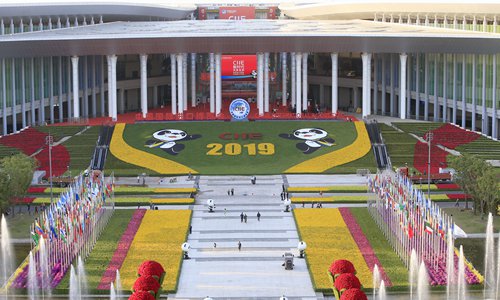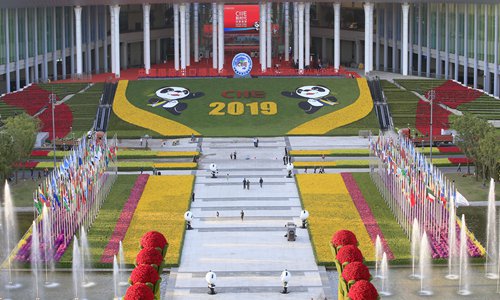
A view of the main entrance of the National Exhibition and Convention Center in Shanghai, where the 2rd China International Import Expo will be held. Photo: Yang Hui/GT
Hong Kong-based companies are putting more hope in the huge and stable mainland market, and take it as their new business focus, as violence has continued to sweep across Hong Kong and even showed signs of aggravation. The trend is reflected by Hong Kong businesses' more proactive participation in the 2nd China International Import Expo (CIIE).
More than 200 Hong Kong-based enterprises have applied for presence at this year's CIIE, up 40 percent compared with last year. They will occupy a total exhibition area of 22,000 square meters, up 60 percent year-on-year, Sun Chenghai, deputy head of the CIIE bureau, told the Global Times on Saturday.
According to Sun, Hong Kong exhibitors are spreading "every exhibition hall," ranging from food and agriculture to sci-tech life and trade in services.
At the second CIIE, Hong Kong exhibitors' total exhibition area is the fourth largest among all overseas participants, just behind the US, Germany and Japan.
Shanghai Party Secretary Li Qiang and Mayor Ying Yong on Friday met a delegation from the Hong Kong Special Administrative Region (HKSAR), headed by its chief executive Carrie Lam Cheng Yuet-ngor. The delegation is visiting Shanghai to attend the CIIE, which will be held at the National Exhibition and Convention Center from November 5 to 10, according to Chinanews.com on Friday.
Hong Kong will also hold a forum themed "Open-up and innovation, win-win cooperation" in Shanghai. Lam will address a sub-forum in the title of "Artificial Intelligence and Innovation Development," the Xinhua News Agency reported on Saturday.
After finishing her visit in Shanghai on Tuesday, Lam will start visiting Beijing and attend the third plenary meeting of the Leading Group of Guangdong-Hong Kong-Macao Greater Bay Area construction, according to a press release of the HKSAR government.
The Hong Kong enterprises' eagerness to get closer to mainland business partners and customers comes at a time when social violences show no signs of subsiding in the city and take a huge toll on various industries in the SAR including retail, tourism and services. In the third quarter, the city's GDP shrank by 2.9 percent year-on-year, dragging Hong Kong into recession.
"Hong Kong desperately needs to find new economic growth engines, otherwise its economy will be locked in a recession for a long time. The CIIE is a great opportunity for the business community to leverage their edges in foreign trade and proximity to the affluent Chinese mainland market into new businesses. It's like a life-saving straw," Dong Shaopeng, a senior research fellow at the Chongyang Institute for Financial Studies at Renmin University of China told the Global Times
Hong Kong CIIE exhibitors also told the Global Times that many Hong Kong businesses will cling on to the Chinese mainland markets, and get a slice of the Chinese mainland's booming economic opportunities.
The China Central Television reported on Saturday that the Hong Kong rioters destroyed and burned shops, news agencies and Hong Kong railway stations, while throwing petrol bombs at many locations, which triggered increasing calls from the business community in the city to stop violence and restore social order, so as to bring its economy back on the right track.
Keen on Chinese mainland market
All Time Healthy Co, a Hong Kong based healthcare products manufacturer and trading company, attended last year's CIIE and saw a very good response from buyers and public visitors, Ken Wong, the company's director, told the Global Times in the "Hong Kong Food" booth which consisted of about 50 Hong Kong food exhibitors including All Time Healthy Co.
This time, the company brought dozens of products to the import expo but highlighted two healthcare products for liver and stomach protection. The two products started selling in Shenzhen Qianhai Free Trade Zone last year and saw a growth of 30 percent in sales this year. "Next year, we hope to double that growth number," Wong told the Global Times.
Although taking root in Hong Kong for many years, the Chinese mainland will be the future business focus for the company, Wong said. "(The) mainland markets are much larger than Hong Kong because of the population gap," he said, also expressing disappointment over Hong Kong's social unrest.
Hong Kong based sauce making giant Lee Kum Kee is also a second time comer to the CIIE. In an email interview with the Global Times, the company said that Lee Kum Kee has benefited from the rapid development of the Chinese mainland.
"In the recent 70 years, especially after the reform and opening-up, the Chinese mainland has made great achievements in economic development, which has attracted world attention. That has also brought along Chinese mainland people's food consumption upgrading their food preferences from 'being full' to 'eating well' and 'eating healthy," the company said, adding that the company has established its manufacturing base in Jiangmen in South China's Guangdong Province.
The Hong Kong-based logistics giant Shing Kee Group also displayed its healthcare and aging products to the 2nd CIIE. Wu Dongjun, exhibition director of the Beijing-based Ability Co, which is owned by Shing Kee Group, said that Shing Kee has exhibited its agricultural and food products at last year's CIIE and has received good feedback, and it hopes to exhibit another business section this year.
He said that although Shing Kee has tapped into the Chinese mainland's health care markets for about one year, it is optimistic about the future of the Chinese mainland's health care market which is also backed by government policy.
"Many medium-and small- enterprises in Hong Kong want very much to participate in and benefit from the Guangdong-Hong Kong-Macao Greater Bay Area initiative," Wong said.



